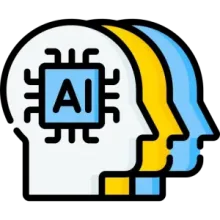LLM Visualization Tools
A nice visualization and walkthrough tool for the LLM algorithm that backs OpenAI's ChatGPT.
Click the website link https://bbycroft.net/llm to explore the algorithm down to every add & multiply, seeing the whole process in action.
- Read more about LLM Visualization Tools
- Log in to post comments
What are AI Agents?
AI agents are revolutionizing the way humans tackle complex challenges, facilitating smarter decision-making and flexible task execution that goes beyond traditional AI systems like chatbots. Unlike chatbots, which rely on predetermined scripts, AI agents function independently, learning from data and adjusting their strategies in real time. This transition from fixed interactions to adaptive, context-aware systems enables them to grasp intent, forecast outcomes, and enhance decisions with minimal human involvement.
- Read more about What are AI Agents?
- Log in to post comments
Inside into optimization solvers series - IBM CPLEX
CPLEX is the first choice for solving large difficult models in mission-critical applications where robustness and reliability are important. Few solvers can come close to match CPLEX's speed and reliability. CPLEX is currently used to solve many of the largest problems in the world, with up to millions of variables, constraints, and non-zeros.
Algorithmic Features
AI prediction methods
Prediction is nothing new but the old concept of getting to guess the future based on previous learning. Every day we encounter a situation where we predict the future outcomes, or we want to know that we could have known this earlier.
- Read more about AI prediction methods
- Log in to post comments
Optimization: An essential tool for business decision-making
Optimization serves as a critical methodology for analyzing complex business challenges and identifying the most effective solutions. Mathematically, it involves evaluating all feasible options to determine the optimal outcome for a given problem.
1. Model Construction: Laying the Foundation
The optimization journey begins with building a mathematical model that encapsulates three core elements:
Vector database for generative AI
A key component of many AI and machine learning (ML) systems is the ability to handle and manipulate vectors and embeddings, which represent complex, high-dimensional data in a way that machines can efficiently understand and process.
What are Embeddings?
Embeddings involve converting data or intricate objects such as text, images, or audio into numerical lists within a high-dimensional space.
- Read more about Vector database for generative AI
- Log in to post comments
Crash the large language models (LLM)
Since the groundbreaking debut of ChatGPT in November 2022, large language models (LLMs) have dominated the AI landscape, reshaping industries and sparking a global race for innovation. The open-source release of Meta’s LLaMa-3 in 2024 and the rise of multimodal models like Google’s Gemini Ultra and OpenAI’s GPT-4 Turbo have pushed the boundaries of what AI can achieve. From coding assistants to creative collaborators, LLMs now power everything from enterprise workflows to personalized education.





